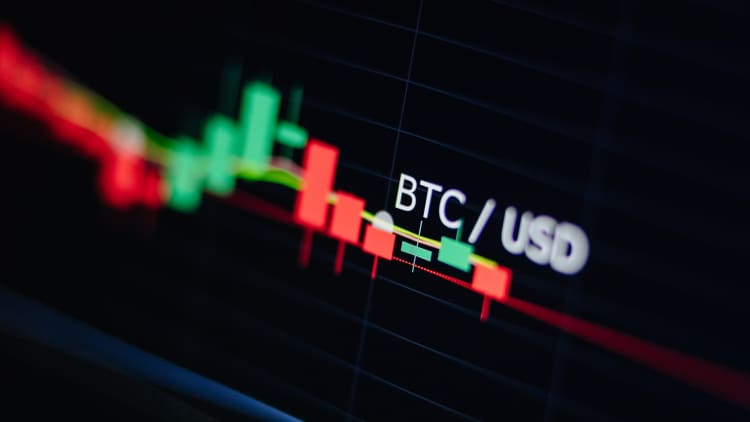

Illustrative image of two commemorative bitcoins seen in front of the national flag of Russia displayed on a computer screen.
Artur Widak | Nurphoto | Getty Images
Russia is considering legalizing the use of cryptocurrency for international payments as the country faces ongoing financial pressure from Western sanctions.
The State Duma, which is the lower house of the Russian Parliament, will on Tuesday consider a law that permits making international payments via cryptocurrencies, Elvira Nabiullina, the governor of Russia’s central bank, said Tuesday.
“Today, the State Duma is considering a law that allows settlements in cryptocurrencies within the framework of an experimental regime,” Nabiullina said, speaking in the Russian Federation Council, the upper house of Russia’s parliament, according to state-owned news agency RIA Novosti.
The Duma is expected to approve the law Tuesday, Reuters reported separately.
Russia’s central bank is also itself looking to move money across borders using crypto, with its chief saying crypto-based payments will take place before the end of 2024.
“We are already discussing the terms of the experiment with ministries and departments, with businesses, and we expect that the first such payments will take place before the end of this year,” she said.
The Russian Embassy in London was not immediately available to comment on the country’s plans to adopt pro-crypto legislation when contacted by CNBC Tuesday.
The central bank’s commitment to use crypto as a method of cross-border payment marks a reversal from the regulator’s previous stance on the technology.
In January 2022, the Russian central bank proposed banning the use of crypto for transactions, as well as the mining of digital currencies, citing threats to financial stability, citizens’ wellbeing and monetary policy sovereignty.
Under pressure from sanctions
It comes as growing tensions between Russia and the U.S. and its allies have led to innumerable sanctions on individuals and entities in Russia in retaliation to its assault on Ukraine.
The U.S., European Union and Britain are among the jurisdictions that imposed sanctions on Russia after its February 2022 invasion of Ukraine. They’ve continued to amp up pressure on the country, targeting President Vladimir Putin, Russia’s financial sector, and countless oligarchs.
Separately, Russia is also exploring the implementation of a digital version of the ruble.
Central bank digital currencies, or CBDCs, are different from crypto. Unlike bitcoin and other cryptocurrencies, which have no central authority governing them, CBDCs are issued by directly by a government and are designed to replicate fiat currencies in the form of a digital token.
Central Bank Governor Nabiullina said Tuesday that the regulator will look to move away from a pilot phase toward mass implementation of the digital ruble from July 2025, Russian news agency Interfax reported.
Can crypto help countries evade sanctions?
Other sanctioned countries have frequently attempted to circumvent such financial curbs through the use of cryptocurrencies.
North Korea has on multiple occasions been accused of raising millions of dollars in crypto to help fund various state programs and evade foreign sanctions.
North Korean state-backed hacking group Lazarus was behind a huge heist on the Ronin Network — a blockchain that supports a popular nonfungible token (NFT) game called Axie Infinity. The hack saw cybercriminals make off with over $600 million worth of digital tokens, blockchain analysis firms Elliptic and Chainalysis have said previously.
Proponents of cryptocurrencies, on the other hand, also claim that the digital assets are a useful tool for countering illicit activities. That’s because the networks that underpin them, called blockchains, are public and show a historical record of transactions that is cryptographically secure and can’t be altered.




